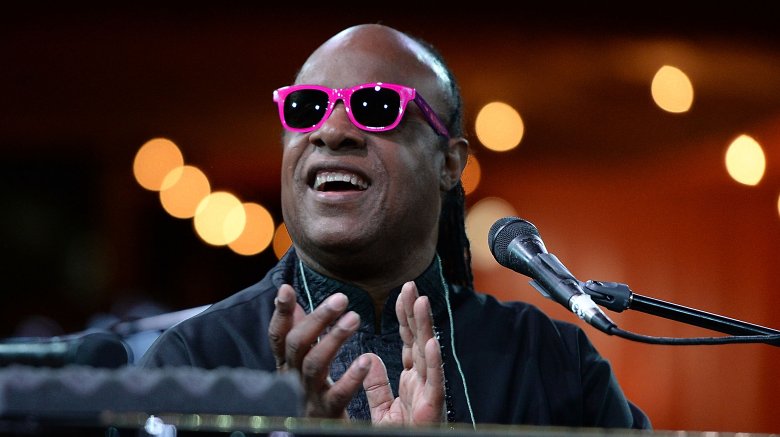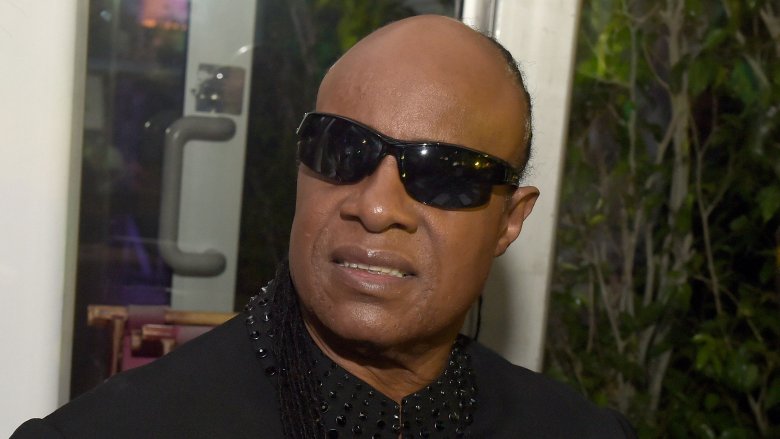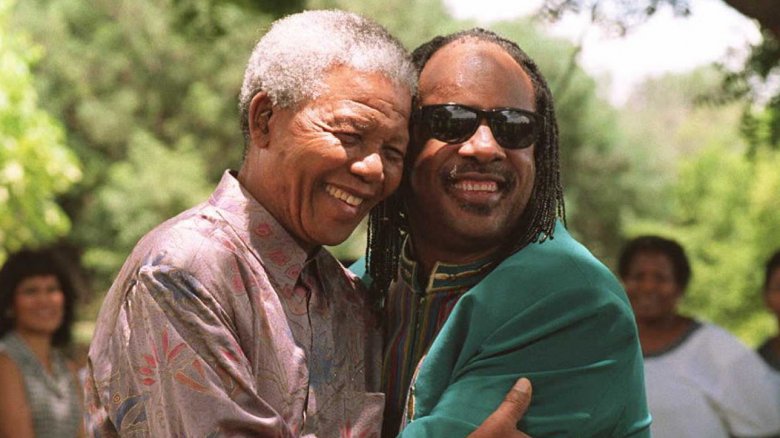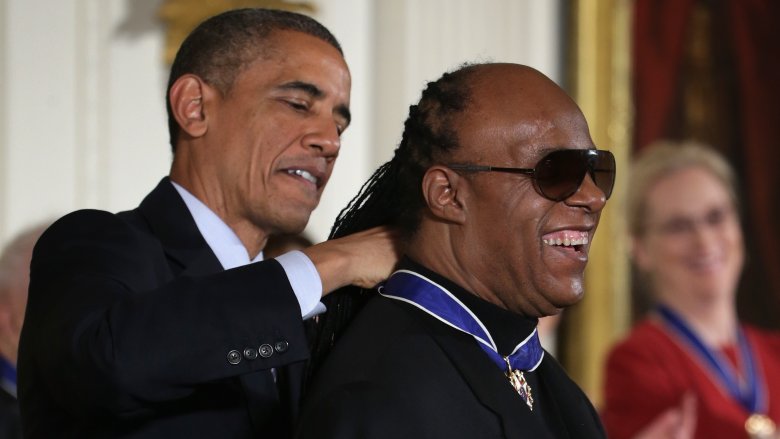The Untold Truth Of Stevie Wonder
Stevie Wonder's addictively funky hit, "Sir Duke," begins with the timeless lines, "Music is a world within itself / With a language we all understand." Truer words were never spoken, let alone sung, and arguably nobody has understood the language of music better than Wonder himself. Wonder, whose legal name is Stevland Morris, mastered the piano, harmonica, and drums by age 9. Those abilities, combined with his phenomenal singing voice, helped him land his first record deal at age 11. Also a gifted songwriter, Wonder went on to craft moving and memorable lyrics while using instruments to convey emotions words can't express.
Across his decades-long career Wonder penned numerous masterpieces, including heartbreaking ballads like "Lately" and joyful songs like "Isn't She Lovely." His most celebrated albums, Talking Book, Innervisions, and Songs in the Key of Life, are the stuff of music legend. He also wrote songs for music legends like Michael Jackson, Smokey Robinson, and Aretha Franklin. Plus, he helped invent a musical instrument. However, Wonder didn't just make music; he made history through activism. He survived almost-certain death and the awful hardships life threw at him. True to his name, he accomplished things that make us wonder if magic exists and if he's made of it. Here's the remarkable story of Stevie Wonder.
He's flown at least two airplanes
Stevie Wonder lost his eyesight as an infant. Born six weeks premature, he received oxygen therapy, which had the then-unknown side effect of causing blindness in premature babies. Despite what many might consider a tragic accident, Wonder "never thought of being blind as a disadvantage." In 2012, he told the Guardian, "I love me! And I don't mean that egotistically –- I love that God has allowed me to take whatever it was that I had and to make something out of it."
Throughout his life Wonder has greeted the world with fearless enthusiasm. As a kid he got into fights over girls and once leaped off the roof of a shed in his backyard. As an adult he went to movies, went bowling, and even navigated airports by himself. According to one of his assistants, people on airplanes thought Wonder was "a junkie 'cause he sits there with these glasses on, and his head goes back and forth, side to side when he feels good."
Some of Wonder's feats have been surreal. In 1973, he told Rolling Stone, "I've flown a plane before. A Cessna or something, from Chicago to New York. Scared the hell out of everybody." During a trip to Ghana, he not only steered but landed a 10-seater plane simply by following instructions given by the pilot. "The sensitivity of his hands was unbelievable," the pilot recalled. Stevie's a Wonder, all right.
His mother survived forced prostitution and domestic abuse
Wonder's mother, Lula Mae Hardaway, co-wrote a number of his hit songs, including the classic "Signed, Sealed, Delivered, I'm Yours" plus "I Was Made To Love Her," both of which are vivid, infectiously passionate declarations of love. Their brilliant collaborations seem more extraordinary when you consider that the beautiful imagery Hardaway helped create contrasted sharply with the crushing ugliness she endured in her own life.
Hardaway was abandoned by her mother as a baby, according to GQ. The unwanted daughter of a sharecropper, she was repeatedly passed between relatives. At age 13 she moved in with her father, the ironically named Noble Hardaway, who sent her away after two weeks. While living with an aunt, a teenaged Lula got pregnant and was kicked out. Desperate, she soon married the brutal Calvin Judkins, who was 30 years her senior, per the LA Times. Judkins beat Hardaway and forced her into prostitution. She also "stole coal to keep her family warm."
Adding to the stress of her horrible home life, Hardaway feared that Stevie Wonder's blindness was God's punishment for some sin she committed, and she took her son to faith healers to no avail. "It bothered me that my mother was crying all the time," Wonder recalled, so he "just told her I was happy to be blind and I think she felt better after that." Eventually, Hardaway and her kids escaped her horrifying husband.
The time he stood up to Motown and won
In 1960, Stevie Wonder was a 10-year-old who was saved from an abominable father and spent his time singing on the streets of Detroit. Thanks to a fortuitous encounter with music exec Berry Gordy, in 1961 he signed with Motown, the industrial juggernaut that would launch the careers of Marvin Gaye, Michael Jackson, DeBarge, and other big-name artists. Making it to the big time didn't mean earning big bucks, however. As recounted in Motown: The Sound of America, Wonder received a 2 percent royalty fee, and a single sold for 98 cents.
Wonder didn't make enough money from an individual sale to give Motown his two cents, but his opinion wasn't worth much to the higher-ups anyway. Most talents had extremely limited creative control, per History, and Wonder was no different. Being the music virtuoso he was, he wanted carte blanche to create greatness. In 1971 he asked for permission to take the reins of his own work. Berry Gordy refused, so Wonder refused to work with Motown and started making an album on his own. His hardball tactic worked, and Motown renegotiated his contract. Free to pursue his artistic ambitions, Wonder would release five albums in five years and create his most beloved and critically renowned albums.
His bizarre legal dispute with a dead lawyer
As a top-tier talent Stevie Wonder deserved top-tier bucks from Motown, which he didn't always get when cranking out hits as a young artist. At the start of his career he got paid peanuts, but that changed after he hired attorney Johanan Vigoda in 1971. Vigoda was nuttier than an almond farm and reportedly liked "wandering around Venice Beach dressed like a homeless person." He also had a habit of spitting out sunflower seeds, and he carried around legal documents in old airline bags. According to author Adam White, the folks at Motown joked "that if Wonder could see the lawyer, he'd fire him." But that eccentric seed-spitter was a shark of a lawyer.
Vigoda remained Wonder's lawyer for 40 years, during which he received a 6 percent royalty fee. But per the terms of their agreement, Wonder was on the hook for life and afterlife. So after Vigoda died in 2011, Wonder and all of his heirs would be obligated to pay all of Vigoda's heirs until the end of time and probably beyond. Wonder claimed he had no idea. After all, he couldn't see the contracts he signed, so Vigoda had to read them aloud. Even with witnesses present, Vigoda could have avoided reading the shady parts or used intentionally confusing legal jargon to hide it. Wonder stopped paying after 20 months, so Vigoda's widow sued for $7 million. They settled out of court.
He wrote 'Superstition' for someone else
Stevie Wonder reached the height of his creative powers in the early 1970s. Having gotten a greenlight from Motown to run with his ideas, he became a mad scientist of sound, experimenting with electronic instruments and turning his innermost thoughts into ear-pleasing and often thought-provoking lyrics. His otherworldly talent was on full display in the hit "Superstition," which appeared on his watershed 1972 album, Talking Book. A song that almost growls as it hypnotizes you with its rhythm, "Superstition" marked "the first time audiences heard a lot of Clavinet, a five-octave electronic instrument similar to an electric piano," according to music critic Tom Moon.
Some might say that "Superstition" was divinely inspired. Wonder came up with it almost instantly while sitting at his drums. The lyrics, however, were anything but supernatural. They reflect his skepticism about superstitious beliefs and his conviction that "when you believe in things you don't understand, then you suffer." The song was uniquely Wonder's in every way except one: He wrote it for someone else. That someone was his buddy, Jeff Beck, a 1970s guitarist. However, Motown honcho Berry Gordy heard the song and knew Wonder was the only one who could truly do it justice. It took some convincing, but Wonder agreed to record the song himself.
The crash that almost killed him
The weeks leading up to August, 6, 1973, "were the best of times for 23-year-old Stevie Wonder," wrote the Salisbury Post. He released his highly acclaimed album Innervisions, and three weeks prior to that his single "You Are the Sunshine of My Life" topped the charts. Yet Wonder couldn't shake the feeling that darkness was on the horizon. He had recently told Rolling Stone that he thought he was about to die, though he didn't know why. Unfortunately, he was almost right. As he rode down a North Carolina highway with his cousin on August 6, an out-of-control truck loaded with lumber smashed into the back of their vehicle.
Wonder suffered a broken skull and slipped into a coma. Ira Tucker, who had known Wonder for ages, recalled seeing him at the hospital: "Man, I couldn't recognize him. His head was swollen up to five times its normal size. And nobody could get through to him." Knowing how fond Wonder was of blasting music, Tucker shouted in his friend's ear hoping to revive him. At first it didn't work, but then Tucker sang, "Higher Ground," one of Wonder's most lauded songs on Innervisions. Finally, the musician responded. Within a week Wonder was out of his coma, and within two weeks he was "entertaining the whole hospital staff with his antics."
The instrument he helped invent
In 1976, Stevie Wonder heard an NBC broadcast about an ingenious machine. As CNBC described, an inventor named Ray Kurzweil had built a device that could read text out loud to blind people. The only thing about it that wasn't inventive was its name: the Kurzweil Reading Machine. Wonder became the first person to buy the reading machine and befriended the inventor.
Kurzweil was a technological prodigy. At age 15 he programmed a computer to read music and make original compositions, per PBS. Thirteen years later, he appeared on TV with his reading machine. Now Wonder wanted him to create a device that could accurately mimic the sounds of different instruments without having to play back recordings. To make his dream come true, Wonder co-founded a company with Kurzweil and served as a musical adviser while Kurzweil handled the technical side of things.
The result was the Kurzweil 250, a computer-keyboard hybrid that could take notes played on the keyboard and make them sound like any instrument or human voice. Introduced to the public in 1984, it's generally regarded as the first computerized instrument in the world that could convincingly reproduce the sounds of orchestral instruments.
His very special phone call from Nelson Mandela
In 1985, Wonder became a thorn in the side of South Africa's racially oppressive apartheid regime. On Valentine's Day, the musician showed up at the South African Embassy in Washington D.C. in a limousine and emerged wearing a fur coat and a sign around his neck that read "Free South Africa." He then volunteered to be arrested alongside 47 other people, declaring himself "a conscientious criminal" and describing his detention as an "expression of love to all the people of South Africa who are against the barbaric policies of apartheid." Later that year, Wonder received an Oscar for the song "I Just Called To Say I Love You" and dedicated it Nelson Mandela, who was in prison at the time for fighting apartheid.
South Africa banned Wonder's music, but he was undeterred by tyrannical pettiness. Instead, he spent his 35th birthday bashing apartheid in front of a United Nations committee and singing "I Just Called to Say I Love You." He even inserted Mandela's name into the lyrics. On Wonder's 55th birthday he welcomed his seventh child into the world. So Nelson Mandela called to say, "I want to name your child." As Wonder's second wife described, "He gave us two names, one of which we couldn't pronounce. So we chose Mandla."
The true meaning of 'Happy Birthday'
This might sound crazy, but Stevie Wonder's "Happy Birthday" isn't actually very happy, and the "you" being wished a happy birthday isn't actually you, unless you're iconic civil rights leader Martin Luther King Jr. As Time explained, that festive-sounding song was all about urging lawmakers to honor MLK with a national holiday and "calling out anyone who didn't support the idea." That's because in the 10 years following King's assassination, other people's efforts to persuade Congress had failed.
Released in 1979, "Happy Birthday" became hugely popular in the early '80s. Wonder then upped the Congressional pressure in 1982 by teaming up with MLK's widow, Coretta Scott King, to start a petition supporting the holiday. According to USA Today, they amassed 6 million signatures, which ain't too shabby. That doesn't mean everyone was swayed, though. Senator Jesse Helms threatened to filibuster the passage of MLK Day legislation because the slain civil rights leader had Communist leanings, which was apparently way worse than the hideous racism King nonviolently fought against. Ultimately, the bill passed, and President Reagan signed it into law in 1983. Three years later, the law came into effect, and now the whole nation pays its respects to MLK, thanks in huge part to Stevie Wonder.
His cousin tried to extort millions of dollars from him
Blood might be thicker than water, but a greedy relative will bleed you dry. In 2012, Stevie Wonder's cousin, Alpha Walker, tried to be that bloodsucker. Aided by his girlfriend, Tamara Diaz, Walker demanded $5 million in exchange for not releasing a video that one detective called "an 80-minute rant against Wonder." The video showed the home of Wonder's late mother in disrepair and footage of his son. Walker, who was on probation for grand theft auto, felt various hardships he experienced in life were somehow Wonder's fault. He also accused the music icon of being a "slumlord" and alleged that Wonder committed incest.
According to ABC, Walker initially demanded $10 million for his silence. When that didn't work, he demanded $5 million, then $500,000 because he was a criminally bad extortionist. Walker was nabbed in a sting operation but tried to argue in court that "he had a constitutional right to make and market the video." Apparently he realized that nobody would buy his argument because he later pleaded no contest. A judge sentenced Walker and his girlfriend to 292 days in jail plus probation and mandatory counseling.
His big (mostly) happy family
If James Brown hadn't beaten him to it, Stevie Wonder would have been perfect for the song, "Get Up (I Feel Like Being A) Sex Machine," because goodness, the man is virile. Wonder has a whopping nine kids (so far) by five women and has been married three times. His first marriage happened way back in 1970 when he said "I do" to singer/songwriter Syreeta Wright, with whom he wrote multiple hit songs after their 1972 divorce. In 2001, he tied the knot with fashion designer, Kai Millard. His most recent ring exchange happened in 2017 with girlfriend Tomeeka Robyn Bracy, who's the same age as Wonder's oldest child (42).
Oftentimes, marrying a celebrity usually means "'til irreconcilable differences do we part," which certainly seems to be true in Wonder's case. But according to the Telegraph, "he reportedly enjoys a good relationship with all his exes." Presumably, "all" doesn't include ex-girlfriend Angela McAfee, who sued the musician for $30 million in 2001. McAfee claimed that Wonder violated a "verbal agreement" to pay her way and also gave her herpes. Wonder countersued, alleging that McAfee stole $160,000 worth of his stuff. A judge instructed them to settle out of court.
Wonder the lover boy
Stevie Wonder is famous for, well, multiple things. But one of those things is lovey-dovey lyrics that melt your heart or, if you don't have a heart, make you gag. But when he sang passionately about the only girl his heart beat for or mailing himself to someone like a love letter, he wasn't just doing it to sell records. As Wonder put it, "No one has been a greater advocate for the power of love in this world than I have, both in my life and in my music."
Wonder's love powers supposedly include an uncanny ability to pick pretty women out of a crowd. Obviously, that's a subjective assessment and one that's further complicated by the fact that Wonder is blind. But for him, there are certain physical giveaways. "A lady that wears an expensive top, is not loud when she speaks, and smells good, that's how I know," he explained. In other words, talk softly and don't carry a big stink. An unnamed source told Page Six that Wonder also believes that a woman being "light on her feet" means she "must be a pretty lady." Plus, he has entourage that tells him if someone has a nice behind.
His posse also helps him put on the charm by telling him what different women are wearing so he can give specific compliments about their outfits. But really, he could just call and say, "I love you."












